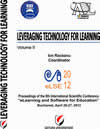ONE SIZE DOES NOT FIT ALL! A THEORETICAL MODEL FOR ADAPTIVE TUTORING SYSTEMS
ONE SIZE DOES NOT FIT ALL! A THEORETICAL MODEL FOR ADAPTIVE TUTORING SYSTEMS
Author(s): Silviu Apostol, Livia Petrescu, Alexandru Sofronia, Dan MihailescuSubject(s): Education
Published by: Carol I National Defence University Publishing House
Keywords: Intelligent tutoring systems; adaptive systems; online learning; artificial intelligence; learner preferences
Summary/Abstract: One size does not fit all! This concept is relevant in many fields, and it constitutes a cornerstone in instruction and learning, where individual differences account for a lot of learning outcomes’ variance [1]. Considering this and other factors, we have developed a theoretical concept for a non-intrusive intelligent tutoring system that uses student facial and vocal features to customize the appearance and behavior of a virtual tutoring agent – a user’s automated companion in computer-based learning environments. It is well known that computer-based learning cannot be built entirely on legacy learning paradigms; the challenges that need to be tackled in computer-based learning require new and innovative theories and educational methods. Using the latest ITC technologies and frameworks, computer-based learning methods and educational content could be adapted to suit students’ real needs while providing access to the most relevant knowledge in the most efficient way. Educators at all levels need to address the diversity in their students’ learning styles, the broad spectrum of individual abilities, and the diversity of socioeconomic and cultural backgrounds. For a while now, teachers have been called on to tailor educational activities for an increasingly heterogeneous student population [2] and there are a lot of success stories that can be discussed. Can we achieve the same flexibility in non-human instruction delivery methods? Can automated learning systems adapt and react to learners’ preferences the same way excellent teachers do in real-life scenarios? We believe so. We believe that using artificial intelligence and affective computing research results, in the near future computers will possess such abilities. What we propose is one step forward in this direction: providing e-Learning platforms with intelligent features that can read and interpret the students’ state and preferences, and adapt their behavior, in real-time, to respond to those preferences. This way, the over-all learning experience becomes more natural, engaging and immersive; thus, users will choose to spend more time learning and also learn more efficiently. This concept tries to replicate at a machine level, our subconscious human ability to constantly analyze faces, voices, gestures and nonverbal expressions of our peers in order to interpret emotions, satisfactions and dissatisfactions, attention, feelings. We propose a theoretical model for this type of artificial intelligence used in customizing the delivery of the instruction. Details relating to user models, intelligent tutor modelling and algorithms for adjusting the tutor model are provided. This approach builds extensively on breakthroughs in intelligent tutoring systems, artificial intelligence, affective computing and evolutionary based studies of human communication. It goes beyond the state-of-the-art by adapting and applying the theoretical research and open-source multimodal
Journal: Conference proceedings of »eLearning and Software for Education« (eLSE)
- Issue Year: 8/2012
- Issue No: 02
- Page Range: 44-49
- Page Count: 6
- Language: English

